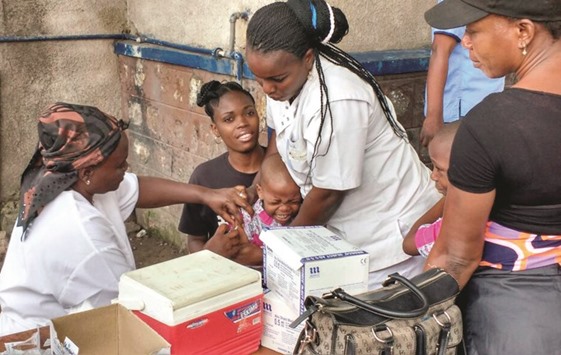A young man was shot dead yesterday when security forces opened fire at a crowd protesting the government’s alleged failure to protect civilians after a gruesome massacre in eastern DR Congo.
Police and troops fired tear gas and warning shots to break up an angry protest in the town of Beni where 51 civilians were hacked to death last weekend in the latest in a string of attacks blamed on rebels.
An effigy of president Joseph Kabila was burned on the town’s main market, as were flags of Kabila’s ruling People’s Party for Reconstruction and Democracy (PPRD), according to an AFP correspondent on the scene.
The protests caused further tension in the Democratic Republic of Congo, where the United States has warned of more violence should Kabila hold on to power after his mandate expires in December.
Security forces stepped in after hundreds gathered in the town’s main street on the last day of a three-day mourning period called by civil society groups over the gruesome murder of dozens of people on Saturday night.
One person “was killed by a bullet to the back”, hospital doctor Jeremie Muhindo told AFP, adding that five people had been injured in the clashes, including three by gunfire.
The head of Beni’s civil society movement Gilbert Kambale confirmed the young man was killed by a police officer while a witness who would not be named said he had been shot at point blank range by a policeman.
At least six demonstrators were arrested in a violent manner, thrown into a military jeep to be taken to an unknown destination, an AFP reporter on the scene said.
The deadly protests came a day after DR Congo prime minister Augustin Matata was booed by hundreds of demonstrators outside Beni’s town hall, where he gave a short speech after a three-hour whistle-stop visit.
Matata visited the massacre site along with senior army and police officials.
“What did he come for? We don’t need humanitarian aid, but peace,” said Germain Katembo, a survivor of the weekend massacre who lost three members of his family.
The killings in and around Beni have been blamed by the government and the UN mission in the country on the rebel Allied Democratic Forces (ADF), a partly Islamist armed group of Ugandan origin.
The group has been present in Democratic Republic of Congo for more than two decades and is accused of a litany of human rights abuses.
The ADF, opposed to Uganda’s president Yoweri Museveni, is thought to be deeply embroiled in criminal networks funded by kidnappings, smuggling and logging.
Thousands of people in Democratic Republic of Congo’s capital Kinshasa queued up yesterday for emergency yellow fever vaccinations aimed at limiting one of the worst outbreaks in decades that has killed hundreds in the region this year.
Makeshift clinics in churches and schools opened across the densely populated city of over 10 mn and in other areas bordering Angola, part of a World Health Organization-led (WHO)campaign against an epidemic that has mostly affected Angola.
Health officials expect to vaccinate 14mn people over the next 10 days, including 8.5mn in Kinshasa, where there are fears of a far wider spread.
That adds to the 13mn in Angola and 3mn in Congo already vaccinated this year.
Those queuing will receive a one-fifth dose of the vaccine in order to eke out limited global supplies. The lower dose protects for 12 months but does not give lifelong immunity.
“People are coming in large numbers to get vaccinated. There is a lot of enthusiasm,” said Eugene Kabambi, a WHO spokesman in Congo.
He acknowledged the challenges of such a vast vaccination drive, including keeping vaccinations cold in areas without electricity.
“We are in an urban milieu where more than 7mn people await their vaccine,” he said.
At a school in the Kinshasa district of Lingwala, a few dozen people, mostly children, had waited for over three hours before their vaccinations arrived.
At other locations in the city, things ran more smoothly.
Close to 100 people lined up at a vaccination site outside a church in the Gombe district.
Tables were set up with cold boxes for the vaccine and yellow medical boxes for waste disposal.
Joel Lina, 32, came for a vaccination at the Gombe church after hearing about the impact of yellow fever in Angola.
“It’s a very evil disease,” he said after his injection.”That hurt for a little while, but now it’s getting better.”

A Congolese child receives vaccination against yellow fever at the Kalembe-Lembe pediatric hospital, in Lingwala district of the Democratic Republic of Congo’s capital Kinshasa.
